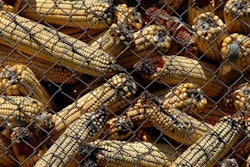
Reducing the amount of stress in pigs can make a noticeable difference in digestibility, said Sheila Jacobi, assistant professor of animal science at The Ohio State University.
Jacobi, while speaking at World Pork Expo, identified eight types of stress that young pigs go through that if managed well, can improve the digestibility of nutrients in their diets and lead to faster growth and better overall health.
Those forms of stresses include:
- Transport stress
- Crowding stress
- Cold stress
- Weaning stress
- Antigen toxin stress
- Mixing stress
- Heat stress
- Nutrition stress
Jacobi pointed out the different forms of stress in pigs during the presentation “Nutritional Factors and Piglet Intestinal Development,” which was part of the program “Gut Physiology Development in Young Pigs – Why is Weaning Age and Digestibility so Important?” The program, which also featured presentations from other swine nutritionists, was hosted by Hamlet Protein on June 8 as a part of World Pork Expo.
World Pork Expo, which is being held at the Iowa State Fairgrounds in Des Moines, Iowa, continues through June 10.


















